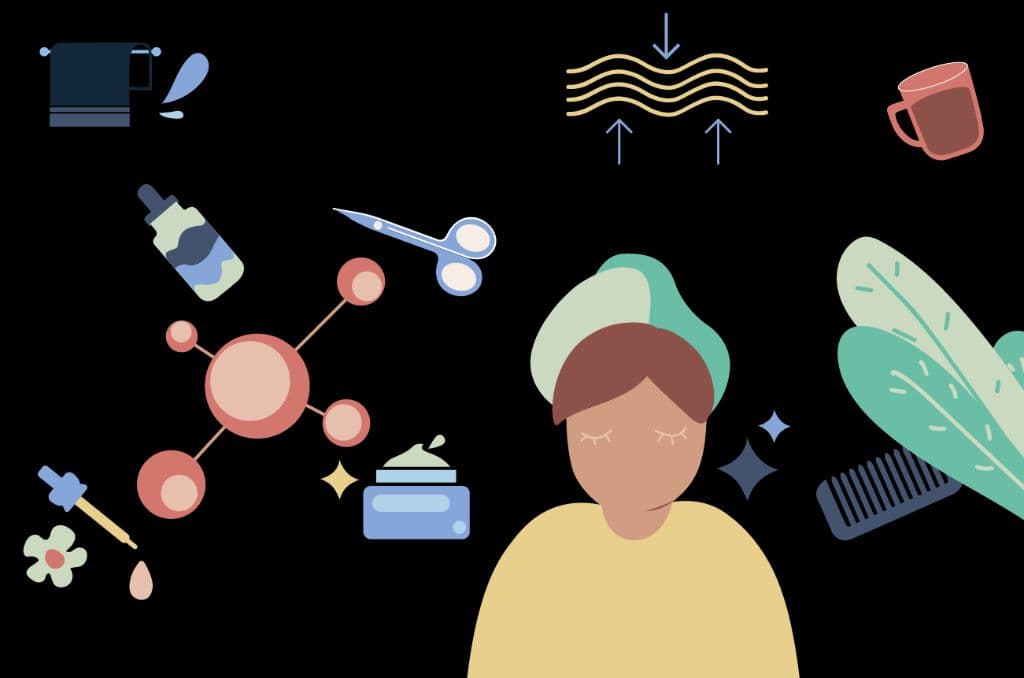This article has been compiled by Vaibhavi Kodnani, a content writer at Proactive For Her.
What is premature greying?
Premature greying is also called premature canities, where canities means greying of hair. It is considered a normal physiological process when it occurs after 35-40 years of age. But this usual age for greying varies across the world - for a specific population, the general age for premature greying maybe earlier, while for some, it may be much later.
When the hair starts greying before the age of 30, it is called premature greying. This premature greying can begin as early as 15 years of age. Another criterion to confirm premature greying is the number of grey hairs - there should be at least 15-25 grey hairs that gradually keep increasing.
What are the causes of premature greying?
The reason behind premature greying is multifactorial; there is no single cause behind it.
Genetics
Genetics is one of the main reasons why your hair may start to grey earlier than it should. If any of your family members experienced premature greying, you are automatically genetically predisposed to get grey hair early.
Medical conditions
Having certain medical conditions can lead to early onset of greying too.
- Atopic dermatitis: It is a skin condition that makes the skin red, itchy and sensitive. So, this condition is known to be associated with premature greying.
- Autoimmune conditions: People with autoimmune conditions such as alopecia areata, psoriasis, diabetes are also likely to experience premature greying.
- Thyroid disorders: Hypothyroidism, hyperthyroidism and thyroiditis are associated with premature greying of hair.
Vitamin deficiencies
If your body is deficient in vitamins and minerals such as B-vitamins like pantothenic acid, iron, copper, it can contribute to premature greying.
Sometimes you may be eating the required nutrients, but due to some underlying conditions like malabsorption syndrome or celiac disease, your body may not be absorbing the nutrients properly. It can lead to deficiencies in your body that may ultimately cause early greying of hair.
Oxidative stress
Various factors such as a stressful event, pollution, UV rays, and consumption of junk generate free radicals that create oxidative stress in the body. Our body uses antioxidants to reduce the damage caused by free radicals. But when these antioxidants are not enough to reduce these free radicals, they damage and age cells and tissues. They also damage the melanogenesis process that occurs in the hair follicles, thus causing premature greying.
Overuse of hair products and hair treatments
Frequent use of hair gels, hair shampoos and conditioners, hair dyes contain harmful ingredients that can decrease the hair melanin, leading to early greying. Even repeated hair treatments like straightening, perming, etc. are contributing factors.
Medications
Some medicines that you are consuming can also cause lightening of the hair.
Smoking and consumption of alcohol
Smoking also leads to oxidative stress in the body. Too much consumption of alcohol leads to malabsorption issues, oxidative issues and inflammation.
When is early greying of hair not considered premature greying?
In certain genetic disorders, the hair loses its colour. These conditions are not a part of premature greying.
Albinism: It is a rare group of genetic disorders that cause the skin, hair, or eyes to have little to no colour.
Vitiligo: In this condition, the skin loses its pigment cells that produce white or discoloured patches on the skin. Even the hair loses its colour.
Is premature greying a sign of something serious?
Usually, premature greying is not a sign of anything. In most cases, the cause is genetics. However, if it occurs very early in life, it is better to consult a doctor and diagnose the exact factors involved in premature greying.
Should you be worried if you get 2-3 grey hairs in your 20s?
Sometimes, 2-3 grey hairs may be a temporary phase and may reverse once you start focusing on eating nutritious food. However, it is better to be vigilant and observe if the number of grey hairs gradually increases. Consulting your doctor earlier on can help reverse your situation.
Can premature greying be reversed?
Reversal of premature greying is not easy, and it is only possible in a small fraction of patients. However, it may be possible to reverse it if the premature greying:
- Is due to some medical condition that is taken care of at the right time.
- Is because of some hair treatments and products that you don’t repeat or use again
- Is because of malnutrition in younger people, and those nutritional deficiencies are corrected
How does premature greying affect you emotionally?
Experiencing premature greying can be distressing as greying of hair is generally considered a sign of ageing. So, it can impact your self-esteem, confidence and happiness. You may start developing a negative relationship with your body. Hence, receiving the appropriate medical treatment and guidance from a doctor is needed.
Since premature greying is not treatable in most cases, doctors usually counsel to help you accept your situation and feel better. Nowadays, there are safer ways to cover up the greys that can help regain your confidence and happiness. If it has harmed your mental health, you can consider going to a therapist to help manage your stress and rebuild your self-esteem.
What are the medical treatments of premature greying?
There are not many treatments available to reverse premature greying. In most cases, it is not curable. But, based on the causes behind premature greying, the doctor may prescribe some treatments.
Supplementation
As nutrition plays a crucial role in the development of our body, first and foremost, your doctor may prescribe you supplements to make up for all nutrient deficiencies. These multivitamin and multimineral supplements would comprise of all trace elements, minerals and vitamins:
- Pantothenic acid
- B-complex vitamins
- Iron
- Copper
- Chromium
- Selenium
Melitene solution
Melitene is a topical solution that promotes melanogenesis and stops the formation of grey hairs. But, it may only work when started at a younger age and if there is no major underlying cause.
Therapies
There are some therapies such as immunotherapies and light therapies like PUVA (psoralen (P) and ultraviolet A (UVA) therapy) that claim to help. However, there is still ongoing research in these fields.
How can you prevent and reverse premature greying through lifestyle and diet changes?
If diet, lifestyle or environmental factors are the reason behind premature greying, then improving them may help reverse it or stop it from worsening. Following these tips can also help prevent premature greying.
Avoid hair products and hair treatments.
Do not use frequent hair treatments such as blow-drying, using heat to straighten, perm, etc. Stay away from using too many products in your hair. Use milder, harsh chemical-free products.
Stop smoking and limit alcohol.
Completely stop smoking as it produces a lot of oxidative stress in the body. You must also limit your alcohol intake. Do not consume it very frequently or in large quantities.
Manage your stress
Relaxation should be a part of your routine. You can meditate, do yoga, exercise regularly, or perform other activities that help relax your body and mind.
Sleep well
Sleep helps fix a lot of issues in the body. So, getting sound sleep at night is crucial. Follow healthy sleep habits such as making your bed, stopping using gadgets, relaxing and sleeping without distractions in a clean space.
Improve your diet
Increase the portions of fruits and vegetables in your diet to get all the required minerals, vitamins and micronutrients. These will also meet your body’s antioxidants requirements. Eat dry fruits and nuts every day too. To compensate for the deficiencies, you can even start on supplements until your diet improves.
Treat underlying conditions
If there are other symptoms with premature greying, meet a doctor to diagnose the problem and reverse the same.
Avoid the medicines causing it.
Stopping the intake of medicines that are causing the lightening of hair can also help.
Try UV protection shampoos and conditioners.
There are shampoos and conditioners available in the market that protect the hair from the harsh UV rays of the sun. However, since these products stay in the hair only for a short period, they cannot protect them for too long. But you can give it a try.
What are the safe options to cover up your greys?
Greys can be easily covered using hair dyes, but choosing the right ones is crucial, or you will end up damaging your hair.
Hair colour
The easiest way to cover up the greys is using hair colour. But, you need to be careful when choosing hair colours. They should not be harsh chemical-based colours that damage the hair. So, make sure to read the formulation before buying it. They should be ammonia and PPD free. PPD in hair dyes can cause allergies and dermatitis. These dyes should also be hypoallergenic, which means they will not cause any skin allergies. Instead of permanent hair dyes, opt for the semi-permanent ones because usually they are more natural, organic and made with botanical extracts that easily wash out and do not cause any hair damage.
Henna
Henna is a natural hair dye that is less damaging than chemical hair colours. However, it comes with its cons - it may dry up your hair and make it orangish that may not match your original hair colour.
Conclusion
Premature greying, although majorly harmless, is a distressing event that can significantly affect your mental health. Not having any promising treatments can intensify the anxiety. So, the only way to feel better is to come to terms with it and move on. There are many ways to cover up the greys, if not reverse them. Those who have not experienced it but want to prevent it can follow the prevention methods such as a good diet and lifestyle habits.
Disclaimer - This information is provided for educational purposes and should not be construed as medical advice. Please consult with your healthcare practitioners before undertaking any changes in your diet or adding supplements.
Proactive For Her is a digital clinic for women, offering accessible, personalized, and confidential healthcare solutions. We offer products and services for out-patient health concerns of Indian women, across their lifetime - from puberty to pregnancy to menopause. To know more on the sexual and reproductive health of women, visit https://www.proactiveforher.com/

